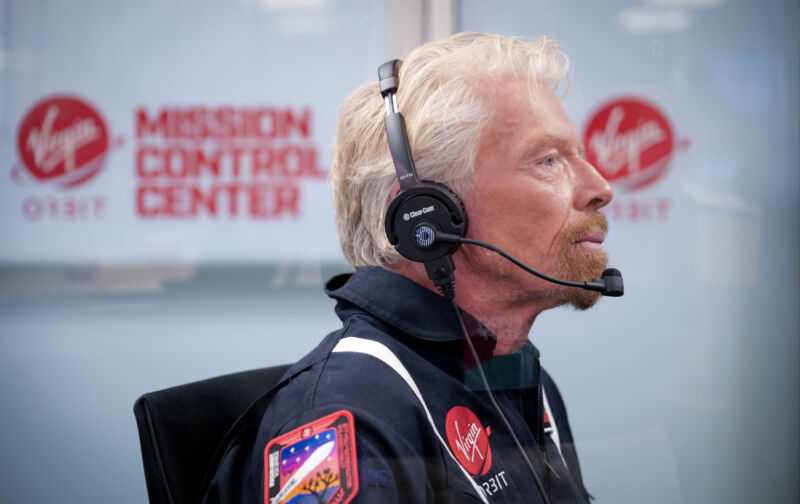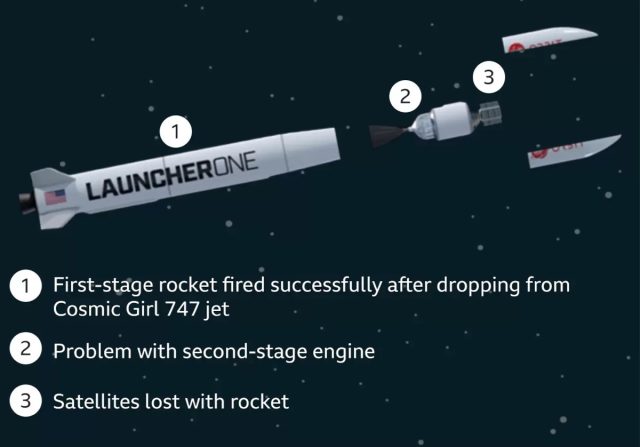
It's been a rough first quarter of 2023 for Virgin Orbit, Sir Richard Branson's US-based flagship satellite launch company. First, the company had a disastrous UK launch attempt in January; the launch failed after a problem with the rocket's second-stage engine. The company's already precarious financial situation went critical in the wake of that failure. As Ars' Eric Berger reported at the time, several financial analysts predicted that the company would run out of money sometime in March.
Those analysts proved quite prescient. BBC News reports that the beleaguered company will pause its operations on Thursday and furlough almost all its staff, although the company did not officially confirm the furloughs to BBC News. In a statement, the company merely said, "Virgin Orbit is initiating a company-wide operational pause, effective March 16, 2023, and anticipates providing an update on go-forward operations in the coming weeks." Shares dropped 18.8 percent to 82 cents (72p) in extended trading in response to the news.
Per our prior coverage, Virgin Orbit started as an idea in 2011 by Branson as an offshoot of his Virgin Galactic space business, with the goal of fully utilizing the White Knight aircraft. Eventually, it was decided that the company, formally created in 2017, would use its own aircraft, a modified Boeing 747-400 named Cosmic Girl, as a platform from which it could drop and launch small rockets. It was funded for most of a decade by the Virgin Group, the multinational company that owns and operates Branson's various businesses, as well as an Emirati state-owned holding company Mubadala Investment Company.
There have long been questions about the company's long-term financial sustainability. Independent estimates suggest that Virgin Orbit spent as much as $1 billion to develop and test its LauncherOne rocket and air-launch system. The company made its first successful launch in January 2021 and has averaged one mission every six months since then. Virgin Orbit went public in 2021, but it raised just $68 million and had to turn to private investments for an additional $160 million to keep operating.
Most recently, Branson has been propping up the company's finances. He invested $25 million in November 2022 and another $20 million in December 2022. Importantly, this was a secured note, giving Branson priority as a creditor for the company's assets, including "all aircrafts, aircraft engines (including spare aircraft parts), and related assets."
The launch failure on January 9 came on the heels of four consecutive successes. The first-stage engine's shutdown appeared to be nominal, with the second stage igniting to complete the 8.5-minute burn to low-Earth orbit. Thirty-five minutes after the rocket's ignition, and long after it should have reached orbit, the company tweeted that a problem had occurred. "We appear to have an anomaly that has prevented us from reaching orbit. We are evaluating the information," the company said via Twitter.

Virgin Orbit did not provide any additional details about the cause of the accident, which led to the loss of nine small satellites on board. But according to BBC News, "Virgin Orbit later said the mission had failed because a rocket fuel filter had become dislodged, causing one of the engines to overheat."
Officials sought to put a brave face on the mission's outcome and Virgin Orbit's future. But in February, Virgin Orbit formally notified investors that it had raised an additional $10 million from Virgin Investments Limited, owned by Branson, further heightening concerns about the company's financial solvency. As Ars reported:
This week's financial disclosure is troubling for several reasons. The $10 million amount is very low, providing only a few weeks of funding for the company given its high overhead and large payroll. Moreover, the note has an interest rate of 12 percent, which is double the rate of the November and December notes, which had interest rates of 6 percent. And finally, the new filing contains a separate security agreement that explicitly turns the unsecured November Branson note into a secured obligation.
Based on the cash Virgin Orbit had on hand last October, the investments from Branson likely extend the company's financial runway into at least April 2023. Therefore, ahead of or during the earnings release in March, it's possible that the company may announce some sort of "review" of its strategic options as it seeks to remain financially solvent.
Stay tuned for more details as they become available.
reader comments
86